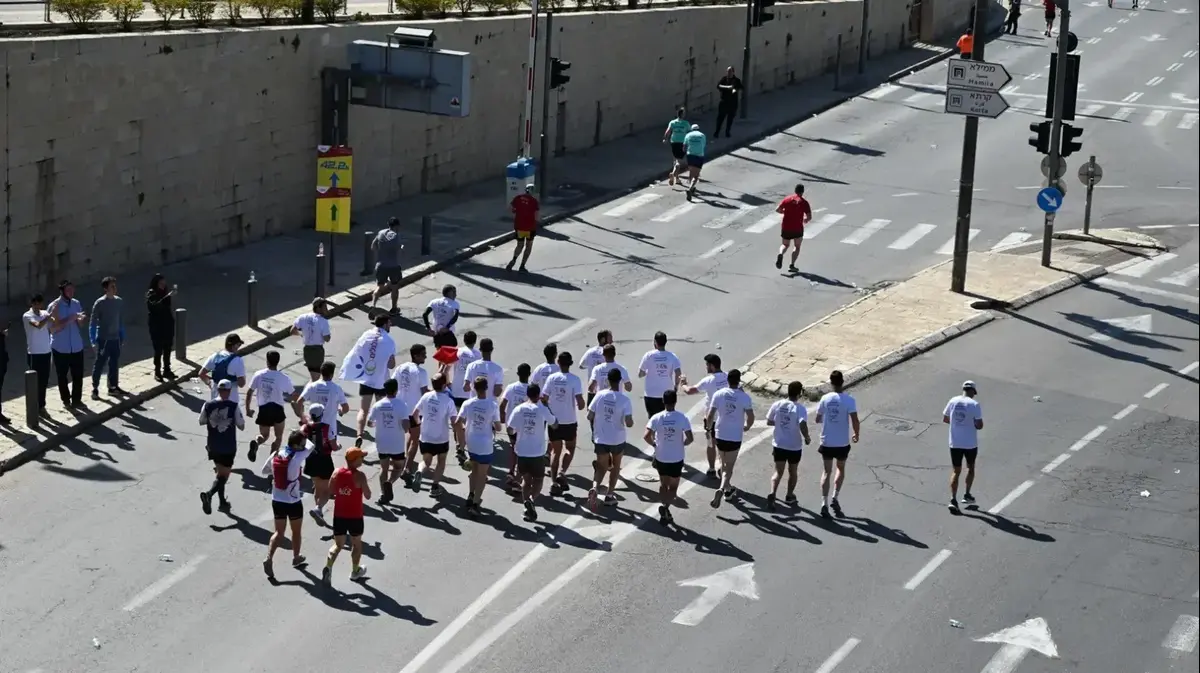The GDR rulers feared their people.
"Nobody has any intention of building a wall," claimed Walter Ulbricht as head of state and party on June 15, 1961 - one of the most weighty lies in history.
In the summer, shortly before the wall was built, he confided to the Soviet ambassador, Mikhail Pervuchin, that "one must reckon with mass riots, open attempts at disobedience, fights and maybe even shootings."
The big brother acted caringly: Marshal Andrej Gretschko, Commander in Chief of the Warsaw Pact armed forces, ordered the GDR Ministry of Health to provide the Ministry of Defense with 35,000 hospital beds by August 10 so that it could set up army hospitals at short notice.
However, after the border was closed on August 13, 1961, there was no uprising among the population, to the surprise of the SED and the state security.
There were only sporadic protests: a leaflet called for resistance here, a few scattered demonstrators stirred up there, as well as small strikes in some factories.
While hundreds of thousands flocked to a rally in front of Schöneberg Town Hall in West Berlin, the cemetery was largely quiet in the east.
Where the inner-city border once ran, explains a text from the Berlin Wall Memorial on Bernauer Strasse, "the SED regime nipped the flaring protest in the bud, the People's Police dispersed every gathering".
Did the security forces really suppress any contradiction?
Or is the common assumption wrong that the building of the wall in the GDR met with broad rejection?
There were no major protests
The historian Robert Rauh, born in East Berlin in 1967, questions the previous view of history in a new book.
He wonders how unproven claims about the GDR citizens' will to resist could get stuck in the collective memory: "Although there are no statistical surveys on the attitude of East Germans in August 1961, there is a consensus in research that the majority were against it."
advertisement
Robert Rauh
"The wall was right!": Why so many GDR citizens accepted the construction of the wall without resistance
Published by be.bra Verlag
Number of pages: 208
Published by be.bra Verlag
Number of pages: 208
Buy for € 20.00
Price inquiry time
08/12/2021 1:50 p.m.
No guarantee
Order from Amazon
Order from Thalia
Order from Weltbild
Product reviews are purely editorial and independent.
Via the so-called affiliate links above, we usually receive a commission from the dealer when making a purchase.
More information here
For example, Gerhard Salter, historian at the Berlin Wall Memorial, asserted in a publication in 2011 with his specialist colleague Manfred Wilke: "Neither the nightly armed men marching in nor the closing of the border met with the majority approval of the East Berliners." The historian Armin Mitter, too and Stefan Wolle believed that they had "identified a potential for resistance among the population that was difficult to quantify in terms of quantity" and that "was in any case greater than the number of those who fully supported the government."
The majority were against the building of the wall - is that right?
This thesis is based primarily on the assumptions of former GDR citizens who soon fled to the West.
They reported that "80 percent of the population do not approve of these measures" or "95 percent do not agree with the regime".
Inevitably, the question arises, "why the GDR citizens did not protest en masse," says author Rauh, who works as a teacher and seminar leader in Berlin.
Breathe a sigh of relief at the SED and the Stasi
The People's Police and the Ministry for State Security (MfS) recorded every incident, no matter how small, on August 13, 1961. The reports and situation reports only contain isolated protests at just 5 of 85 Berlin sector crossings with "gatherings" of 100 to 500 people. Over the course of the day, barely 8,000 GDR citizens came to the border, which was initially only cordoned off with barbed wire, Spanish horsemen and hollow blocks - and among them were onlookers and supporters of the building of the wall.
Already in the afternoon the SED district leadership was relieved to be able to take stock of the fact that "a normal Sunday life prevails" in the capital of the GDR.
The MfS, whose informers investigated the attitude of the population, reported that "the positive comments far outweighed";
It is emphasized that »finally the 'escape from the republic' has been put a stop to« and »the handicrafts of cross-border commuters and smugglers have been put down«.
It may be that the »ritual determination of an approving attitude of the majority of the population to the politics of the leadership was typical for MfS mood reports«, as the historian Daniela Münkel writes.
Nevertheless, the SED propaganda struck a chord with many GDR citizens: they viewed the "border crossers" who worked in West Berlin and lived in or near East Berlin with envy and resentment.
more on the subject
Cross-border commuters before the Wall was built: When Berlin was an open city
These commuters received part of their salary in West Marks and bought consumer goods that were in short supply or not available at all in the GDR.
Or they exchanged the West money at the favorable rate of at least one to four in East Marks.
In the east, they used this to pay for the cheap, state-subsidized food and rent - at least until the beginning of August.
Eight days before the Wall was built, the "New Germany" reported that the Berlin magistrate had fulfilled the "wishes of the population": "Cross-border commuters are registered and pay rent, electricity, gas and water in Westgeld."
In July 1961, 61,200 cross-border commuters were registered with the West Berlin employment offices. In addition, there were an estimated 20,000 illegal, predominantly female, cross-border commuters who mainly worked in the textile industry or as cleaning staff in private households. Shortly before the Wall was built, one in ten of East Berlin's workers was supposedly working in West Berlin - and the GDR labor market, which the ongoing refugee movement had already thinned out, was missing.
Wolf Biermann, who studied philosophy at the Humboldt University in East Berlin in 1961, also believed in the necessity of building the wall.
In 2016, the singer-songwriter described in his autobiography how on August 13, 1961 he was “dispatched” with several students from my seminar group “for agitation” to distribute leaflets in households on the sector border: “We rang the doorbells and chatted the suspicious citizens between the door and hinge full. "
Enlarge image
Wolf Biermann (2014): "Rescue in dire need"
Photo: Stephanie Pilick / dpa
The “temporary” border closure, he argued at the time, was intended to prevent “West Berlin smugglers' hordes” from “buying out our state-owned HO stores illegally” by “selling the already dirt cheap bread and meat and socialist butter at a rate of 1: 5 «Withheld from the working people of the GDR.
Cross-border commuters should "no longer work in the west for Westgeld, but be allowed to live dirt cheap in the east for low rents."
Biermann, born in Hamburg in 1936, moved to the GDR in 1953 and expatriated in 1976 as a key figure in the GDR opposition, "welcomed the construction of the Wall as a rescue in dire need": "I didn't want my hope, the GDR, to run out like a rusted bucket . "
"The wall was built right," say many ex-GDR citizens in a survey
This is how many citizens felt.
The fact that people came to terms with the SED state shows, according to Rauh, the birth rate as "a decisive indicator": It rose sharply from 1961 to 1963, unlike after the failed popular uprising in 1953 or in the crisis years 1956/57.
Rough does not justify the building of the wall, of course, the book title "The wall was right!" Is a quote from an East Berliner.
The wall, the author makes clear, was wrong: "17 million East Germans were deprived of their liberties, families and friendships were torn apart, and at least 140 people lost their lives at the Berlin Wall alone."
The reactions of the population to this turning point have so far hardly been researched.
That's why Rauh and Marten Paetzelt, a social sciences student at Humboldt University, interviewed a good 600 former GDR citizens from November 2020 to April 2021 who had witnessed the construction of the Wall.
Almost 54 percent judged it as "correct from the point of view of the time" - surprising for Rauh too, especially since almost every third of the supporters had relatives in the West and more than a third did not consider the GDR to be democratically legitimized.
The numbers seem paradoxical: Even most of the supporters did not believe the SED propaganda that the border wall served the protection of the GDR and the preservation of peace.
They knew that the monster structure separated families and restricted freedom of movement.
Still, they justify it in hindsight.
How can this be explained?
Private letters from East to West, such as those published by Romanist Hildegard Baumgart in 1971 under the title "Letters from Another Land", could provide information: They give, according to Rauh, "an authentic insight into people's emotions and thoughts."
Despite "criticism of the GDR that was expressed surprisingly openly in places", letter writers from all generations and social strata had defended the wall.
Mass protest only at a rock concert
Two examples among many: An elderly man suffered from separation from his sons, who had fled to the West, and wrote to them that the border through the middle of the city was "shocking, but it was high time to secure us and protect us from further losses «. An engineering student from Thuringia met a West German businessman at the Leipzig trade fair; In the course of years of pen friendship, he wrote that "even the Federal Republic of Germany is not an ideal" for him: "It would never have occurred to me to leave the GDR."
Other events unsettled more GDR citizens, such as the suppression of the Prague Spring in 1968 or the expatriation of Wolf Biermann in 1976 after a concert in Cologne.
The wall was not an issue in the papers of the opposition movement of the 1980s, nor in the appeal to found the New Forum in September 1989 or at the large demonstration on November 4, 1989.
There had been protests against the wall two years earlier.
At Whitsun 1987 around 5000 mostly young GDR citizens streamed in front of the barriers at the Brandenburg Gate to at least acoustically experience a rock concert in front of the Reichstag in the west.
When the GDR police began to disperse the crowd, people chanted "The wall must go!" And "Open the gate!".
"It was," Rauh sums up, "the only mass protest against the Wall in the history of the GDR."









